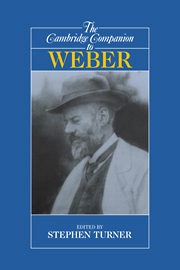Book contents
- Frontmatter
- Introduction
- PART I RATIONALITY, RATIONALIZATION, AND PSYCHOLOGY
- PART II POLITICS AND CULTURE
- PART III RELIGIONS AND THEIR ECONOMIC ETHICS
- 8 Max Weber’s Protestant Ethic and the Spirit of Capitalism
- 9 Max Weber’s Orient
- 10 Max Weber’s Ancient Judaism
- PART IV LAW AND ECONOMICS
- Further reading
- Index
10 - Max Weber’s Ancient Judaism
from PART III - RELIGIONS AND THEIR ECONOMIC ETHICS
Published online by Cambridge University Press: 28 May 2012
- Frontmatter
- Introduction
- PART I RATIONALITY, RATIONALIZATION, AND PSYCHOLOGY
- PART II POLITICS AND CULTURE
- PART III RELIGIONS AND THEIR ECONOMIC ETHICS
- 8 Max Weber’s Protestant Ethic and the Spirit of Capitalism
- 9 Max Weber’s Orient
- 10 Max Weber’s Ancient Judaism
- PART IV LAW AND ECONOMICS
- Further reading
- Index
Summary
Ancient Judaism is perhaps Weber's greatest single creation. Nearly 500 pages in length, though unfinished at the time of his death, it is the largest of the three major studies of the three-volume Gesammelte Aufsätze zur Religionssoziologie (Collected Essays in the Sociology of Religion) (GARS). The work is deeply rooted in Weber's thought. In the Protestant Ethic Weber had already emphasized affinities between Judaism and the outlook of Puritanism, suggesting that ascetic Protestantism had inherited the “perfectly unemotional wisdom of the Hebrews” which had seen “the rational suppression of the mystical, in fact the whole emotional side of religion” (PE 123). He observed that despite its distinct petty-bourgeois and traditionalistic tendencies, “Old Testament morality was able to give a powerful impetus to that spirit of self-righteous and sober legality which was so characteristic of the worldly asceticism o f … Protestantism” (PE 165).
By the time of Ancient Judaism, Weber's appreciation of the significance of the Hebrew legacy had deepened in proportion as his investigations broadened to deal with the origins of western rationality. One can also read the argument of Ancient Judaism as Weber's response to Nietzsche on the very large questions of the “genealogy of morals” and the significance of the Judeo-Christian tradition for the fate of western modernity in general. For Weber shared with Nietzsche a preoccupation with the peculiar character of the religious impulse as such, especially insofar as powerful inner forces are unleashed in directions that lead to various “unnatural” and self-denying practices (FMW 271-272).
- Type
- Chapter
- Information
- The Cambridge Companion to Weber , pp. 200 - 220Publisher: Cambridge University PressPrint publication year: 2000
- 7
- Cited by

